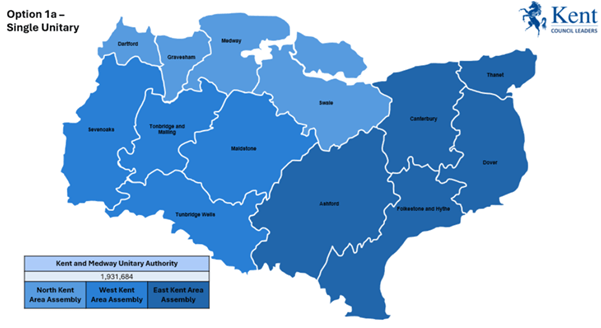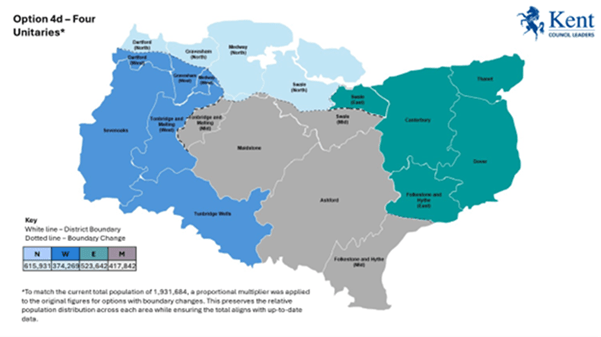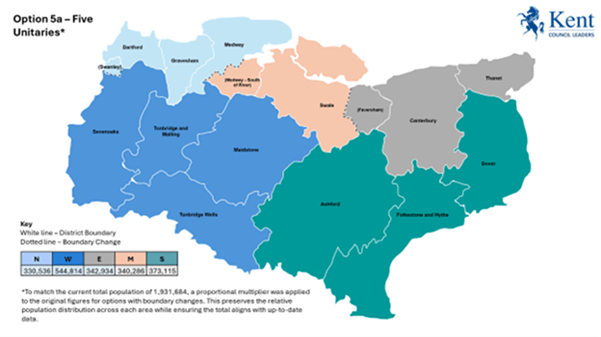Devolution
Updates
February 2026
The Ministry of Housing, Communities and Local Government has launched its consultation on the models for Local Government Reorganisation in Kent and Medway. You can find out more about the consultation on the Government website.
December 2025
In the biggest shake-up of local government in 50 years, ministers asked councils to come up with plans to create unitary councils.
Under the current system, Kent County Council (KCC) delivers some services, such as education, social services and roads, and district or borough councils deliver others like emptying your bins and providing housing services.
Under the proposed system, unitary councils would deliver all council services in one area. Medway Council operates in that way today. During November, councillors across Kent and Medway have been meeting to decide their preference.

The proposal for a single unitary council covering Kent and Medway to include three area assemblies covering the north, east and west of the county has been supported by:
- Kent County Council

The three unitary option consisting of Dartford, Gravesham, Medway and Swale in the north; Sevenoaks, Tonbridge and Malling, Maidstone and Tunbridge Wells in the west and Ashford, Canterbury, Thanet, Dover and Folkestone and Hythe in the east has been supported by:
- Folkestone & Hythe District Council
- Maidstone Borough Council
- Sevenoaks District Council
- Tonbridge & Malling Borough Council
- Tunbridge Wells Borough Council

The four unitary council option, which stuck to existing boundaries and consisted of Dartford, Gravesham and Medway in the north; Sevenoaks, Tonbridge and Malling, Maidstone and Tunbridge Wells in the west; Swale, Ashford and Folkestone and Hythe in the middle of Kent and Canterbury, Thanet and Dover in the east has been supported by:
- Dover District Council
- Swale Borough Council
- Thanet District Council

Option 4d would reorganise Kent and Medway into four new unitary councils. North Kent would bring together Medway, Gravesham, Dartford, most of Swale, and small parts of Tonbridge & Malling and Maidstone. East Kent would combine Canterbury, Thanet, Dover, eastern Swale and part of Folkestone & Hythe. West Kent would unite Tunbridge Wells, Tonbridge & Malling and Sevenoaks. Mid Kent would cover Maidstone, Ashford, southern Swale, parts of Tonbridge & Malling and part of Folkestone & Hythe.
It has been supported by:
- Ashford Borough Council
- Canterbury City Council
- Medway Council

Option 5a proposes five unitary authorities for Kent.
It would see a council for north west Kent that would take in the existing Gravesham and Dartford boroughs and Swanley which currently sits under Sevenoaks District Council.
It would also extend eastwards, taking in areas currently under Medway Council up to the River Medway, and southwards to Snodland. Mid Kent would be formed of the rest of Medway and the rest of Swale. West Kent would combine Sevenoaks, excluding Swanley, Tonbridge & Malling, Maidstone and Tunbridge Wells. East Kent would be made up of the Faversham part of Swale, Canterbury and Thanet. South Kent would combine Ashford, Folkestone & Hythe and Dover.
It has been supported by:
- Dartford Borough Council
- Gravesham Borough Council
What happens next
Ministers are now expected to analyse the proposals and launch a public consultation early in the new year. A decision by the government on the final structure of unitary councils is expected in the summer.
Additional documents
- Kent Local Government Reorganisation business case option 3A
- Covering letter from the five Kent authorities
- LGR options letter
March 2025
Draft Kent interim plan
On 19 March 2025 our cabinet considered recommendations concerning Kent’s interim submission for local government reorganisation (LGR) in the county.
Final submission
On 21 March 2025, Kent and Medway leaders sent the final interim plan for the local government reorganisation to the Minister of State for Local Government and English Devolution alongside a cover letter explaining our position and progress.
In addition to this, Maidstone Borough Council, Tunbridge Wells Council, Sevenoaks District Council, Tonbridge and Malling Borough Council and Canterbury City Council also sent an additional paper to supplement the submission, alongside a covering letter outlining the reason for the supplementary document.
Maidstone Borough Council, Tunbridge Wells Borough Council, Sevenoaks District Council, Tonbridge and Malling Borough Council have also written to the Minister of State for Local Government and English Devolution regarding their position on geographical boundaries.
Both Kent County Council and Medway Council have written separately to the Minister of State for Local Government and English Devolution regarding their position on LGR.
February 2025
Response from the government
On Wednesday 5 February 2025 the leader of Kent County Council was told by the government that Kent and Medway had not been selected as one of the areas that would be part of its Devolution Priority Programme.
In his letter to Kent leaders, Jim McMahon OBE, MP Minister of State for Local Government and English Devolution, said:
“I had to make a judgement of the best-placed areas to take forwards on the programme according to our strict criteria, and, in the round, concluded your proposals could not be taken forward due to concerns about the size of the population disparity between the two proposed constituent members of your proposed Kent and Medway combined county authority and the consequential impact on its governance."
“I believe this will affect your readiness and ability to meet the delivery criteria of the white paper, and that local government reorganisation would benefit your area before a mayoral institution is established.”
Formal invitation Local Government Reorganisation
On Wednesday 5 February 2025 we received our formal invitation to submit Local Government Reorganisation proposals. These proposals will bring together lower and upper tier local government services in new unitary councils. The letter sent from Jim McMahon OBE, Minister of State for Local Government and English Devolution, sets out the criteria against which proposals will be assessed and further guidance on what information the proposals should include.
It also confirms when we have to submit our proposals back to the government. Interim proposals were due on or before 21 March 2025 and full proposals by 28 November 2025. These are stated in the timeline below.
Elections
Now that Kent will not be preparing for a mayoral election in 2026, the local county elections will go ahead as planned on May 1.
July 2024
Devolution expression of interest
The leader of Maidstone Borough Council along with the leaders of Kent County Council, Medway Council and the other district and borough councils in Kent submitted an expression of interest to the Deputy Prime Minister in July 2024 just after the general election setting out how they are keen to work with government to shape an innovative and comprehensive devolution deal for Kent and Medway.
Devolution and local government reorganisation
The government’s English Devolution White Paper, was published on 16 December 2024, it set out its plans for devolution and local government reorganisation, with the aim of moving power away from Whitehall and simplifying local government structures. The government has stated it wants all remaining two-tier areas in England to eventually be restructured into single-tier unitary authorities.
The current system of local government
Currently, local areas in England can have single-tier local governments known as ‘unitary authorities’ or two-tier local governments (district councils and county councils). Each county council area has multiple district councils within it.
Unitary authorities carry out all local government functions, whereas two-tier areas have some functions carried out by the district council, such as planning and waste collection and some by the county council, such as education and transport.
Kent, is a two-tier area and services are split between Kent County Council (KCC) and each of 12 city, borough or district councils including Maidstone. Some areas also have parish councils.
What is devolution
At the moment many decisions are made by central government. Through devolution, the government gives powers and funding from central government to the local government so these decisions are made locally.
Devolution is about making decisions closer to the local people, communities and businesses those decisions affect.
Benefits of devolution
Devolution could mean:
- better coordination of transport across the whole region
- a stronger voice for the region with central government
- better support for skills development for residents because money is spent locally rather than by national government
- more strategic control over planning and housing
Local government reorganisation
Local government reorganisation is the process that changes the structure and moves the responsibilities of local authorities. In the English Devolution White Paper, the government have said they want to move away from the current two-tier system of district and county councils. The government has said that for most areas this will mean creating councils with a population of 500,000 or more.
Government plans
Devolution is not new. There are already a number of combined authorities across the country. Other areas have previously agreed devolution deals.
The government is seeking to strengthen many of the devolution arrangements currently in place and wants the whole of England to have a consistent approach with regional representation.
The government’s preference is for every area in England to have a Mayor. It is establishing new ‘strategic authorities’ to be led by mayors, they will be given a range of devolved powers and are separate, additional, legal entities to unitary authorities.
Directly elected mayor
The government wants the new strategic combined authorities to have a directly elected mayor. A directly elected mayor would represent all areas included in the strategic authority, including the geographical area of Maidstone.
This would be similar to existing arrangements across the country such as Manchester where Andy Burnham is the Mayor of the Manchester Combined Authority and all the unitary councils. For example, Salford City Council, have council leaders.
Devolution and reorganisation
Now that devolution is not currently going ahead, the government advised all Kent and Medway authorities that a local government reorganisation would benefit the area before a mayoral institution was established.
We received our formal invitation to submit Local Government Reorganisation proposals. These proposals will bring together lower and upper tier local government services in new unitary councils.
Local government reorganisation for Maidstone
All two-tier authorities must make plans to merge to create single authorities and make structures simpler and more efficient.
The leaders of KCC, Medway Council and all twelve district and borough councils had until 21 March 2025 to come up with an interim proposal as to how Kent and Medway could be divided into unitary authorities. Full proposals are expected by 28 November 2025.
Proposals must address six criteria, each with several elements:
- a proposal should seek to achieve for the whole of the area concerned the establishment of a single tier of local government
- unitary local government must be the right size to achieve efficiencies, improve capacity and withstand financial shocks
- unitary structures must prioritise the delivery of high-quality and sustainable public services to citizens
- proposals should show how councils in the area have sought to work together in coming to a view that meets local needs and is informed by local views
- new unitary structures must support devolution arrangements
- new unitary structures should enable stronger community engagement and deliver genuine opportunity for neighbourhood empowerment
Maidstone’s cabinet consideration of recommendations concerning Kent’s interim submission for Local Government Reorganisation in the county can be found on our webpage.
Timelines
- February 2025 - Statutory invitation received from government to submit unitary proposals
- March 2025 - Submit interim Local Government Reorganisation proposal
- Autumn 2025 - Submit full Local Government Reorganisation proposal
- May 2027 - Elections (shadow authorities)
- April 2028 - Vesting day for new unitary councils
Shadow authorities
A shadow authority is a temporary governing body that prepares for the creation of a new local government authority. Shadow authorities are used to plan and transition the functions of existing councils to new ones. The shadow authority brings together all current county and district elected members. It will undertake specific functions associated with the creation of the new unitary authority and will no longer exist once the new council goes live.
Devolution in other areas
You can read more about devolution in other parts of the country:
- Greater Manchester Combined Authority (seven devolution deals since 2009)
- West Midlands Combined Authority (three devolution deals since 2015)
